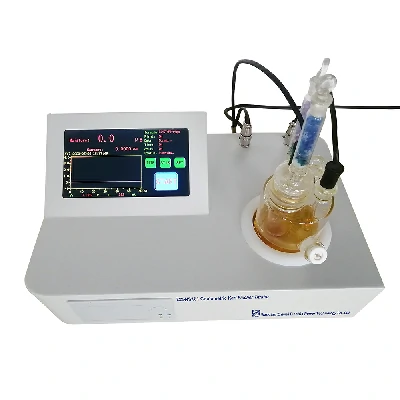Karl Fischer (KF) coulometric titration is a widely used method for determining the water content in various substances, including oils, solvents, and chemicals. While KF titration itself is not specifically designed for diagnosing machinery faults, it can provide valuable diagnostic insights when applied in the context of condition monitoring and maintenance of machinery.
Here are some diagnostic capabilities of KF coulometric titration for detecting machinery faults:
- Detection of Water Contamination: One of the primary applications of KF titration is to detect water contamination in oils and lubricants used in machinery. Excessive water content in lubricating oils can lead to accelerated wear, corrosion, and degradation of machinery components. KF titration can identify changes in water content over time, indicating potential leaks, seal failures, or ingress of water into the machinery system.
- Monitoring Lubricant Degradation: Water content in oils and lubricants can accelerate the degradation of lubricant additives and base oils, leading to reduced lubricating properties and increased friction and wear. By measuring water content with KF titration, maintenance personnel can monitor the degradation of lubricants and assess their effectiveness in protecting machinery components against wear and corrosion.
- Identification of Oil Oxidation: Water content in oils can promote oxidation and degradation of oil molecules, leading to the formation of acidic by-products and increased acidity levels in the oil. KF titration can detect changes in water content and acidity levels, providing indications of oil oxidation and degradation. karl fischer coulometric titration High acidity levels may indicate the presence of acidic contaminants or degradation products, which can contribute to machinery faults and performance issues.
- Assessment of Seal Integrity: Seals and gaskets are critical components in machinery systems, preventing the ingress of contaminants, including water, into sensitive components such as bearings and gears. Changes in water content measured by KF titration can indicate seal failures or breaches in the machinery enclosure, allowing maintenance personnel to identify and address potential sources of water contamination.
- Predictive Maintenance Insights: By monitoring water content and trends over time using KF titration, maintenance personnel can gain insights into the condition of machinery components and predict potential failure modes. Sudden increases in water content or deviations from established baselines may signal impending machinery faults, prompting proactive maintenance actions to prevent downtime and costly repairs.
While KF coulometric titration is primarily used for quantifying water content in oils and lubricants, its diagnostic capabilities extend beyond simple moisture measurement. When integrated into a comprehensive condition monitoring program, KF titration can provide valuable insights into machinery health, lubricant condition, and potential failure modes, supporting proactive maintenance strategies and ensuring the reliability and performance of industrial equipment.

